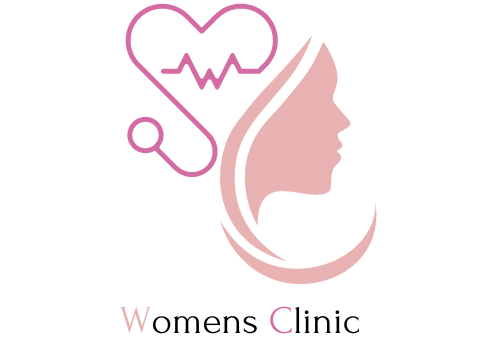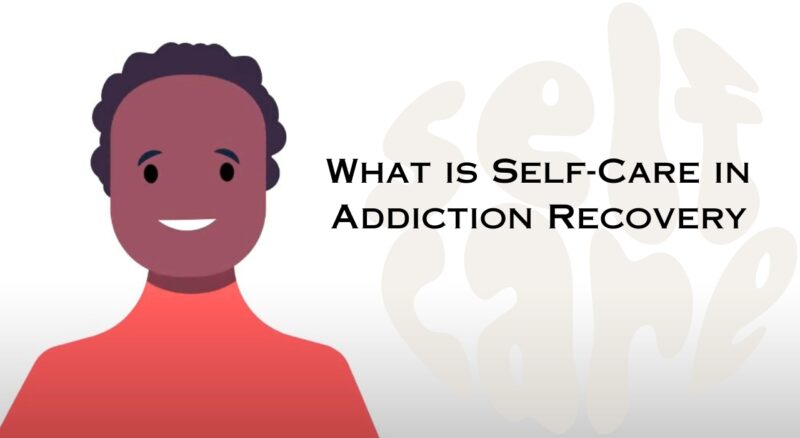Recovering from addiction is a lifelong journey that requires commitment, effort, and, most importantly, self-care. But what exactly does self-care mean in the context of addiction recovery? This article delves into the fundamentals of self-care, its importance, and how you can incorporate it into your recovery process.
Types of Self-Care in Recovery
Self-care is the active participation in enhancing one’s own physical, mental, and emotional health. In addiction recovery, it takes on a critical role, as substance misuse often stems from disregarding these aspects of wellness.
1. Physical
This refers to activities that improve your physical health, such as regular exercise, a balanced diet, and adequate sleep. These practices help to repair the physical damage caused by addiction and keep your body strong enough to resist cravings.
2. Mental
This includes activities that stimulate your mind, such as reading, learning, and problem-solving. It also involves seeking professional help from therapists or counselors to handle psychological issues related to addiction.
3. Emotional
This is about processing and understanding your emotions, and it may involve meditation, mindfulness, journaling, or therapy. It’s about learning to cope with negative emotions without turning to substances.
The Importance of Self-Care in Recovery
Self-care is integral to recovery, as it lays a foundation for overall well-being and resilience. Substance misuse often comes with self-neglect, which leads to a myriad of problems.
Promotes Healing
Self-care helps in healing both the body and mind from the damage caused by addiction. Adequate sleep, good nutrition, and regular exercise can repair physical damage, while mental and emotional self-care can help address psychological wounds.
Builds Resilience
Practicing self-care can increase resilience against stress and potential triggers, reducing the risk of relapse.
Enhances Self-Esteem
As individuals practice self-care, they often experience a boost in self-esteem, which is critical for maintaining sobriety. People who value themselves are more likely to make choices that reflect that self-worth.
Practical Self-Care Strategies

There are numerous strategies one can employ in practicing self-care. These strategies should address the physical, mental, and emotional aspects of health.
Physical Strategies
- Regular exercise: Activities such as walking, yoga, or even gardening can be effective.
- Balanced diet: Aim for a diet rich in fruits, vegetables, lean proteins, and whole grains.
- Adequate sleep: Establish a regular sleep schedule and ensure your sleep environment is conducive to good sleep.
Mental Strategies
- Continual learning: Engage in activities that stimulate your mind. This can be reading, puzzles, or learning a new skill.
- Therapy: Regular sessions with a mental health professional can provide strategies to manage stress and cope with triggers.
Emotional Strategies
- Mindfulness: Practices such as meditation and mindfulness can help you understand and manage your emotions.
- Journaling: Writing about your experiences and emotions can be a therapeutic outlet.
- Therapy and support groups: Connecting with others in recovery can provide emotional support and shared understanding.
Overcoming Barriers to Self-Care
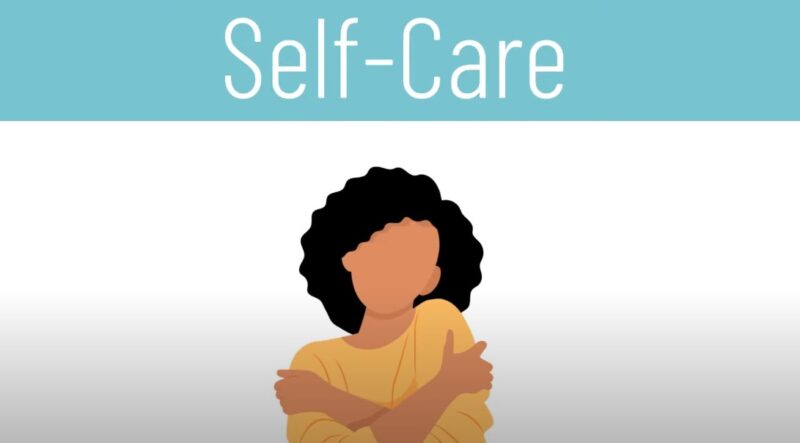
Practicing self-care is often easier said than done. It’s common to encounter barriers along the way, but with a little determination, you can overcome them.
Lack of Time
Many people feel they don’t have enough time for self-care. However, it’s important to prioritize it as you would any other critical appointment. Remember, self-care isn’t selfish—it’s necessary for your recovery.
Feeling Undeserving
Some individuals in recovery struggle with feelings of unworthiness. However, everyone deserves to take care of themselves. Recognize these feelings, and work with a therapist or support group to overcome them.
Not Knowing Where to Start

With so many aspects of self-care, it can feel overwhelming to start. Consider working with a counselor or therapist who can help you develop a personalized self-care plan.
The Role of Support Systems
Having a solid support system can greatly enhance your self-care practices. Friends, family, support groups, and healthcare professionals can all be part of this system.
- Emotional Support: Having people who understand what you’re going through can provide immense emotional relief. Support groups, in particular, can be very helpful as they offer a sense of shared experience.
- Accountability: A support system can also help keep you accountable for your self-care practices, encouraging you when motivation wanes.
- Professional Guidance: Health professionals can provide advice and treatment options that improve your self-care practices, from dietary advice to mental health strategies.
Self-Care and Relapse Prevention
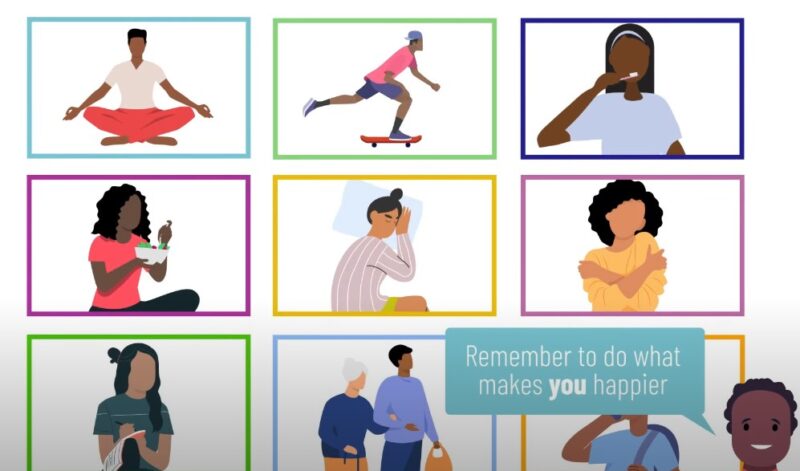
Relapse prevention is a critical part of addiction recovery. Self-care strategies can bolster your efforts and help you maintain your sobriety in the long term.
Recognizing and Handling Triggers
Identifying situations or emotions that trigger your desire to use substances is important. With this knowledge, you can develop coping mechanisms such as mindfulness practices or seeking support when faced with these triggers.
Balanced Lifestyle

Maintaining a regular routine that includes exercise, adequate sleep, and healthy eating can stabilize your body’s functions, reducing the desire to turn to substances for energy, stress relief, or sleep.
Mental Health Management
Regular therapy or counseling can provide techniques to manage stress, anxiety, and depression, all of which can contribute to relapse if not properly handled.
Nurturing Relationships
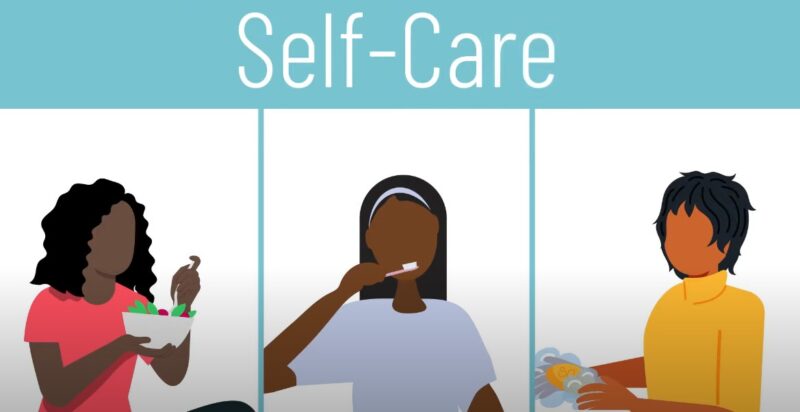
Building and maintaining healthy relationships is another essential aspect of self-care in addiction recovery. This can mean different things for different people:
- Rebuilding Damaged Relationships: Addiction can strain relationships with friends and family. Part of self-care may involve apologizing, making amends, and rebuilding trust where possible.
- Setting Boundaries: Sometimes, self-care means setting boundaries with people who may negatively impact your recovery, including those who enable your addiction.
- Cultivating New, Healthy Relationships: Joining support groups or engaging in social activities can provide opportunities to create new, supportive relationships with individuals who understand your journey.
Self-Care through Creative Outlets
Creativity can be a powerful form of self-care. Engaging in creative activities can provide a sense of accomplishment, an outlet for self-expression, and a distraction from cravings or negative thoughts.
- Art Therapy: Drawing, painting, or other forms of visual art can be therapeutic and relaxing.
- Music: Whether it’s playing an instrument, singing, or just listening to your favorite songs, music can help manage emotions and reduce stress.
- Writing: Journaling or creative writing can provide an outlet for expressing thoughts, feelings, and experiences related to your recovery journey.
Mindfulness and Meditation
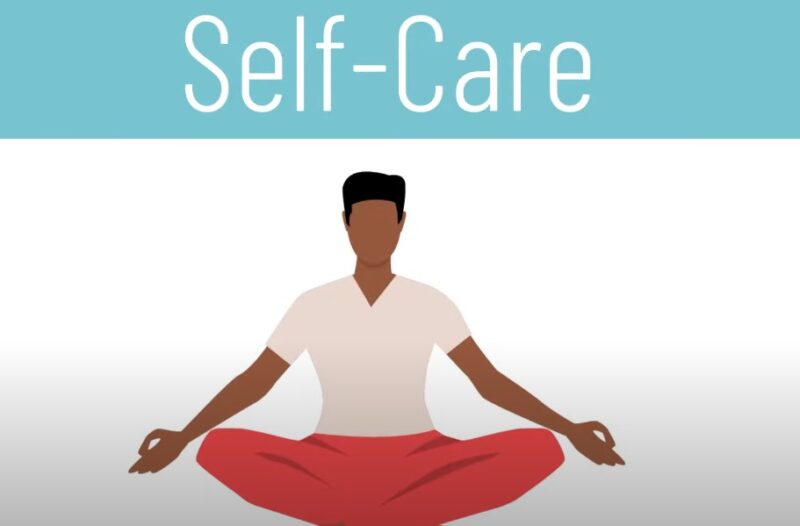
Mindfulness and meditation can play a significant role in self-care during addiction recovery. They offer ways to cope with stress, manage emotions, and stay present.
- Mindfulness: This practice involves being fully present and engaged in the current moment. It can help you identify triggers, manage cravings, and cope with negative emotions.
- Meditation: Regular meditation can reduce stress and anxiety, improve focus, and increase self-awareness. It’s a tool that can support your recovery journey in multiple ways.
- Yoga: Combining physical postures, breathing exercises, and meditation, yoga can offer physical and mental benefits. It can improve physical strength and flexibility, reduce stress, and enhance self-awareness.
The Role of Nutrition in Self-Care

A healthy diet is a vital aspect of self-care in addiction recovery. Proper nutrition can help repair physical damage from substance misuse, improve mood, and boost energy levels.
- Balanced Diet: A diet rich in fruits, vegetables, lean proteins, and whole grains provides essential nutrients for physical healing and ongoing health.
- Hydration: Drinking enough water is critical for various body functions, including flushing toxins from your body and maintaining energy levels.
- Consultation with a Dietitian: A dietitian can provide personalized advice and meal plans that cater to your specific needs and preferences in your recovery journey.
Explore the remarkable positive impact and health benefits that women can experience when they choose to quit drinking, a vital component of success in addiction recovery, as discussed in our article on self-care in addiction recovery.
Final Words
Self-care is a multifaceted approach that plays a crucial role in addiction recovery. Embracing it can enhance the quality of your recovery, build resilience, and improve your overall well-being. Start your self-care journey today; your future self will thank you for it.
